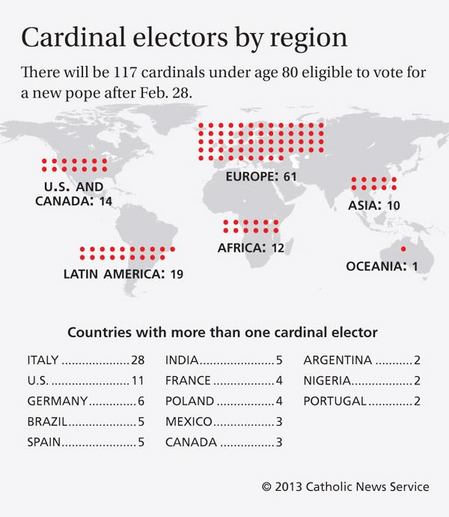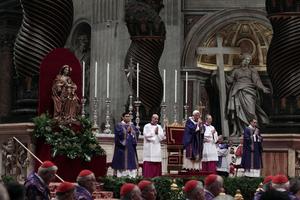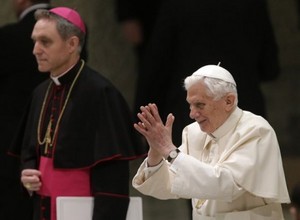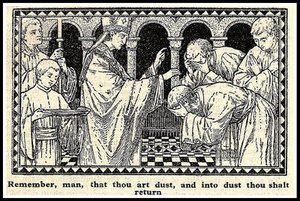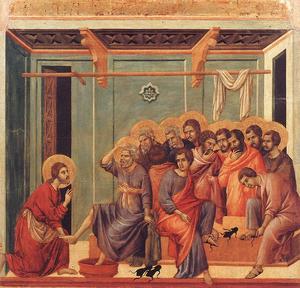Saint Claude la Colombière
A pivotal saint for our time is the Jesuit Father Saint Claude la Colombière (1641-82) known mostly for being spiritual director of Saint Margaret Mary. He died on the First Sunday of Lent.
Saint Claude was a great believer in Divine Providence, Love and Mercy as revealed by Christ Himself and pledged himself to this mission. Both of these saints were instrumental in the devotion to the Sacred Heart of Jesus. Father Claude was devoted to working with the poor.
It is said that the day after his death, Saint Margaret Mary received supernatural assurance that Father Claude needed no prayers, as he was in already heaven.
Pope John Paul II, during the canonization of Saint Claude said,
The past three centuries allow us to evaluate the importance of the message which was entrusted to Claude. In a period of contrasts between the fervor of some and the indifference or impiety of many, here is a devotion centered on the humility of Christ, on his presence, on his love of mercy and on forgiveness. Devotion to the Heart of Christ would be a source of balance and spiritual strengthening for Christian communities so often faced with increasing unbelief over the coming centuries.
Weigel’s Evangelical Catholicism: Deep Reform in the 21st-Century Church
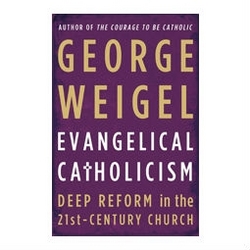 In today’s mail I received my copy of George Weigel’s latest book, Evangelical Catholicism: Deep Reform in the 21-Century Church (Basic Books, 2013).
In today’s mail I received my copy of George Weigel’s latest book, Evangelical Catholicism: Deep Reform in the 21-Century Church (Basic Books, 2013).
“The internal dynamics of he Church itself, attentive tot eh promptings of the divine Bridegroom and the unique challenges posed to the Great Commission by late modernity and post-modernity, have, together, impelled a new evolution in the Church’s self-understanding and self-expression. The result of that evolution, Evangelical Catholicism, is an expression of the four enduring marks of Christian ecclesial life –unity, holiness, catholicity, and apostolicity.”
Continue reading Weigel’s Evangelical Catholicism: Deep Reform in the 21st-Century Church
Liturgical notes for the papal transition
The United States Conference of Catholic Bishops (USCCB) under the direction of Monsignor Richard Hilgartner of the Secretariat for Divine Worship, has produced a packet of materials regarding the pope.
God Recycles — Happy Ash Wednesday!
Benedict XVI’s homily for Ash Wednesday: “return to God with all our heart,” and you will be new people
Today, Ash Wednesday, we begin a new Lenten journey, a journey that extends over forty days and leads us towards the joy of Easter, to victory of Life over death. Following the ancient Roman tradition of Lenten stations, we are gathered for the celebration of the Holy Eucharist. The tradition says that the first statio took place in the Basilica of Saint Sabina on the Aventine Hill. Circumstances suggested we gather in Saint Peter’s Basilica. Tonight there are many of us gathered around the tomb of the Apostle Peter, to also ask him to pray for the path of the Church going forward at this particular moment in time, to renew our faith in the Supreme Pastor, Christ the Lord. For me it is also a good opportunity to thank everyone, especially the faithful of the Diocese of Rome, as I prepare to conclude the Petrine ministry, and I ask you for a special remembrance in your prayer.
Benedict XVI: to whom do you belong? –asks for prayers for himself and future pope
When the Pope came into the Paul VI Hall he was greeted with lots of people which is typical, but there seemed to be more than c. 8000 people in attendance. The outpouring of affection was evident. Before the weekly teaching, he said,
Dear brothers and sisters, as you know I decided. Thank you for your kindness. I decided to resign from the ministry that the Lord had entrusted me on April 19, 2005. I did this in full freedom for the good of the Church after having prayed at length and examined my conscience before God, well aware of the gravity of this act.
I was also well aware that I was no longer able to fulfill the Petrine Ministry with that strength that it demands. What sustains and illuminates me is the certainty that the Church belongs to Christ whose care and guidance will never be lacking. I thank you all for the love and prayer with which you have accompanied me.
I have felt, almost physically, your prayers in these days which are not easy for me, the strength which the love of the Church and your prayers brings to me. Continue to pray for me and for the future Pope, the Lord will guide us!
The catechesis the Pope offers us today…
Continue reading Benedict XVI: to whom do you belong? –asks for prayers for himself and future pope
Ash Wednesday
Ash Wednesday is a day of fasting (required for those between the ages of 18-59; encouraged for all others) and a day of abstinence from meat (for all aged 14 and up) it is NOT a holy day of obligation. There is no obligation to receive ashes.
What does fasting mean?
Fasting means partaking of only one full meal for the day. Two smaller meals may substitute in order not to weaken. No eating between meals.
What does abstinence mean?
The practice of abstinence is defined as not eating red meat; eggs and milk products are acceptable.
Blessed John Paul II reminded us that “While preserving their value, external penitential practices are never an end in themselves, but an aid to inner penitence, which consists of freeing the heart from the grip of sin with the help of grace, to direct it toward the love of God and our brothers and sisters.“
Lenten practices: confession of sins, praying the Stations of the Cross, giving alms, doing an act of charity. Prayer, fasting, and almsgiving form one unit, to separate them makes the whole thing incoherent. Many people attend Mass more often than once a week.
“For the sake of the joy which lay before him he endured the cross, heedless of its shame” (Hebrews 12-2).
OUR sede vacante … the key players… in the papal election
- The Apostolic Penitentiary Manuel Cardinal Monteiro de Castro, 74, does not cease working like many of the other offices of the Holy See and Vatican because the work of the Penitentiary pertains to the forgiveness of sins and matters of questions of conscience from the faithful. Sins and justice need to be forgiven. De Castro and his coworkers will remain in office.
- The Chamberlain (the Camerlengo), Tarcisio Cardinal Bertone, SDB, 78, who is the current Secretary of State, will see to the management of the temporal goods of the Church. Bills need to be made and leadership provided. He functions in this capacity during the sede vacante. Moreover, he will also head the Congregational meetings, that is, the daily meetings of the College of Cardinals discussing the needs of the Church. The cardinals will hear a “state of the Church.” During the conclave, Bertone will announce the result of every ballot, ascertaining the votes required for election. Cardinal Bertone will show the new pope to the papal apartments and hand him the keys. The Chamberlain will be assisted by Bishop Giuseppe Sciacca , 57, from Catania, who functions as a legal consultant.
Continue reading OUR sede vacante … the key players… in the papal election
Douthat evaluates Benedict’s resignation
Ross Douthat “conservative columnist” of The NY Times writes about Pope Benedict’s resignation yesterday. He pinpoints how in recent years, in many ways very recent years, how the ministry of the Bishop of Rome has changed. And not for the better.
